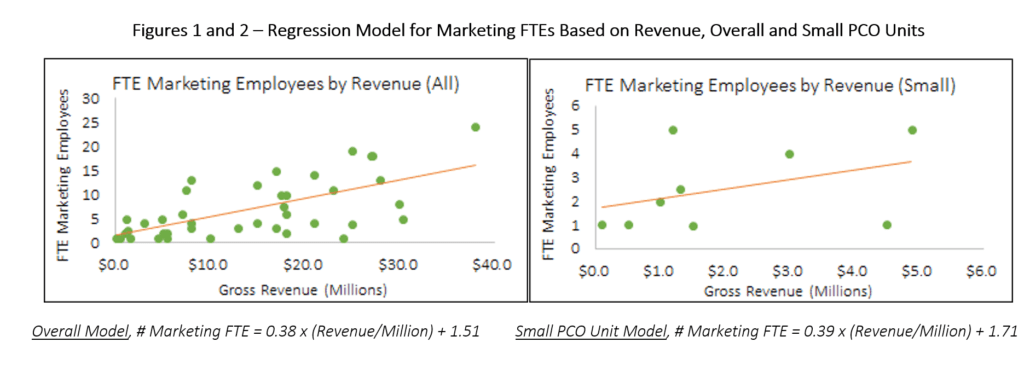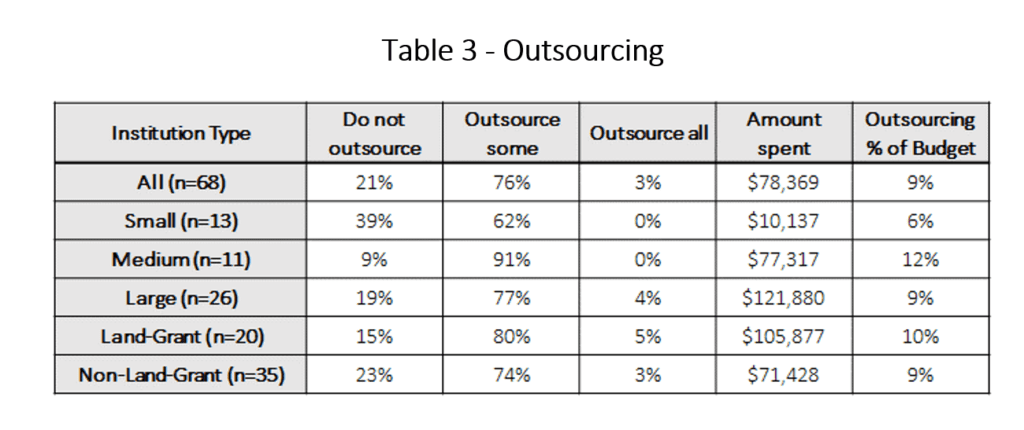UPCEA Member Analytics: Managing a Marketing Infrastructure
No longer is marketing just the development of a catalog, viewbook, brochure or billboard. It now includes marketing strategy and customer engagement as well as brand management. In an evolving economy fueled by data analytics, making wise marketing resource and infrastructure decisions is critical. Earlier analyses have shown that there has been a clear shift toward digital media spending and dedicating resources toward having a marketing competency has become foundational to competing in the professional, continuing and online (PCO) education market. The 2018/19 UPCEA Marketing Survey shows that for every eight PCO employees hired, one is a marketing team member (Table 1). Smaller PCO units may be more likely to either have existing non-marketing staff do marketing tasks, use centralized marketing resources or potentially outsource the function.
Table 2 shows a metric that could be important in how an institution might grow its marketing staff with revenues. This suggests that for every $3.7M of revenue an institution generates, a marketing staff member should be added. Further interpretation might also suggest that in start-up mode or when a PCO unit is new, the metric or revenue expectation should be under $1M or roughly $977K per marketing staffer.

Further refinement of the survey results may also suggest marketing resource allocation could be set at different levels. For example, overall, there is a baseline of 1.51 FTEs, which could include a marketing director and a part-time administrative person. Marketing staff would be added for every $2.63M of revenue in this situation. In a small PCO scenario, a linear regression identifies 1.71 as the baseline FTEs. However, given the small sample size and cluster of points with less than $1M in revenues and 1 FTE, one could argue that a start-up or small PCO unit might start with one marketing professional, such as a manager, coordinator or even a director.

The limitation of the model and analysis is that it looks at past and recent UPCEA member survey results and may not adequately prepare the unit of the future or one that wants to compete more aggressively. For larger PCO units, it should be assumed that economies of scale are likely to be achieved, and thus, this end of the model may be less reliable or predictive and that a bootstrapped or alternative model may be more relevant. Also, the role of real-world and intuitive decision making should come into play to adapt the results of this research to the institution’s or unit’s goals and propensity for risk. The analysis becomes more difficult to predict with the growth of outsourcing. Seventy-nine percent of PCO units outsource at least some of their marketing needs, with 3% outsourcing all of it (Table 3). On average, PCO units have spent $78,369 on outsourcing, with large institutions spending the most ($121,880) and small institutions the least ($10,137). Most of the marketing outsourcing is for digital marketing activity, as on average, PCO units spent 63% of their outsourcing dollars on electronic marketing. Overall, outsourcing costs could amount to 9% of the entire marketing budget, which includes labor, media and other operational items.

Having or outsourcing a marketing competency appears to be a necessity in order for a PCO unit to compete. Whether the unit chooses to market through an existing relationship with an Online Program Management (OPM) provider, use of an outsource marketing partner, central college or university marketing support, or creating a free-standing marketing unit within the PCO unit, marketing is a strategic function that should be planned and resourced appropriately based on the institution’s goals for the future.
PCO leaders and their marketers must address the following issues as they move into a changing market for higher education:
- How much should the PCO unit invest in marketing resources, including personnel, partnerships and media?
- How complex is the portfolio, competition or marketing objective in that decisions need to be made to build or outsource marketing functions?
- Can the central marketing unit of the greater institution effectively market PCO programs? Can central marketing effectively market degrees, certificates and other credentials aimed at adult and corporate learners?
- How much should a PCO unit invest in marketing new programs along with maintaining enrollments for existing programs?
- Can the PCO unit attract marketing talent to achieve enrollment and strategic goals?
- How will the PCO unit measure performance and accountability of marketing efforts?
The convergence of dramatic changes in higher education and the increase in social and digital technologies has prompted the demand for marketing leaders who are skilled at reaching the different constituents in today’s adult learner market. UPCEA has a robust network of marketing and enrollment professionals and conferences to help address many of these challenges.
Learn more about UPCEA's expert consultants.
Do you need help with your PCO unit or campus? We can help. Contact UPCEA Research and Consulting for a brief consult. Email [email protected] or call us at 202-659-3130.
Trusted by the nation's top colleges and universities, UPCEA Research and Consulting provides the best value in the industry today. UPCEA's industry experts have years of experience in Online and Professional Continuing education - put them to work for you!
UPCEA Research and Consulting offers a variety of custom research and consulting options through an outcomes-focused pricing model. Find the option(s) that best suit your institution.
Learn more about UPCEA Research & Consulting
The UPCEA Difference
Unmatched Experience: For more than 100 years, UPCEA consultants have exclusively served the needs of online and professional continuing education programs. UPCEA consultants leverage their extensive industry expertise to expedite solutions, anticipate upcoming shifts, and offer distinct best practices, effectively aiding clients in achieving their goals.
Cost Effectiveness: As a nonprofit, member-serving organization, we provide unmatched value, allowing you to maximize limited research and consulting budgets.
Action in Motion: Our cadre of experienced, skilled authorities and expert practitioners propels you forward, translating research and consulting into impactful implementation, a distinctive hallmark of UPCEA. Our team of current and former institutional leaders will support you, turning research and consulting into action.
Mission Alignment: Like you, our mission is to enhance and expand educational opportunities and outcomes for adult and other non-traditional learners. We share your values and work in partnership with you to advance access and excellence in education.
